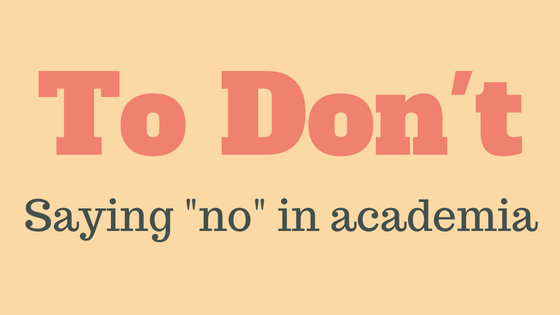Early in my academic career a dear friend gave me a piece of paper from a pad. Across the top in bold orange all caps was: To-don’t List. It was divided into four quadrants: to avoid, to delay, to pawn off, and to sabotage. At the bottom it encouraged me to “Just don’t do it.”
With the sheer number of things to do–class prep, grading, committee meetings, email, proposals, writing (!?!)– it is no wonder we amble through our days overwhelmed and exhausted. But part of my goal here is to try to convince you that it does not have to be this way, and the more I can teach you a better way, and we can all go out and live this better way, the less soul-crushing academia will be. (Call me crazy.)
Why do we take on so much? As doctoral students we often don’t even think it’s an option to say no. Then as assistant professors, we feel like we are obligated to do everything that people suggest because tenure-track jobs are so prized (and scarce). In a sense, we all feel that imposter syndrome. If I don’t do X, they will find another one of the 100 PhDs that applied for this job and send me packing, we think. (Ugh! If that inner critic would just shut up already!)
But here’s a reality check: This very attitude actually makes it more likely that you will indeed be sent packing. (Take a deep breath. We’re not gonna let that happen!) The market it tough, and saturated, and if you don’t spend time in those CV- and reputation-building activities (like publishing), you could very well be denied tenure and dismissed.
That’s why we absolutely must learn to say “no.”
Saying no comes from a place of deep self-love and respect. It is self-preserving, and self-healing. It is NOT selfish. (Tweet that!)
Finding balance (and joy!) in your academic life requires this self-love and self-respect. You deserve to create the career (and life) you want in academia. In fact, your unique, once-ever-on-earth perspective on your field must be heard. That’s how we make (and share) knowledge. And that’s the whole point, isn’t it?
So we need to develop our nay-saying skills. We need to develop our “to don’t” list. But this can be a little more complicated than just shouting “no” at everyone (though I am often tempted to do this. I can picture my colleagues calling university security now…) When I first started out as an assistant professor at a university in a bilingual context, I was interested in interdisciplinary collaborations. I wanted to see how people were using their two (or more) languages in science labs, agriculture classes, and psychology workshops. When I would network with professors on my campus, they would ask what I did and I would say, “I’m an English professor. I teach ESL and I train ESL teachers in our Master’s program.”
This was mistake number one. Cause instead of saying, “That’s awesome! My students are so creative with language and we use English texts all the time but speak in Spanish while we do it! We should write a grant together!” They said, “That’s awesome! Do you think you can proofread an article I want to submit? Because I’m not that great at English.”
Seriously? This person thinks I got a PhD to be proofreader? Respect to all the proofreaders out there (what would we do without you?) but that was NOT my goal. It would make me SO mad, and kind of backed into a corner of having to say no to someone I just met.
Then I realized that the way I was presenting myself didn’t effectively communicate who I was and what I wanted to do. I started to change how I described myself. “I study bilingualism in Puerto Rican classrooms. Do you use English or Spanish texts in your class? Do you give your lectures in Spanish or English?” By saying this I was presenting myself as a researcher with an agenda with specific opportunities for collaboration. Then they would have to say no to me. 😉
Best (just kidding—that sounds so academic ;)),
Cathy






